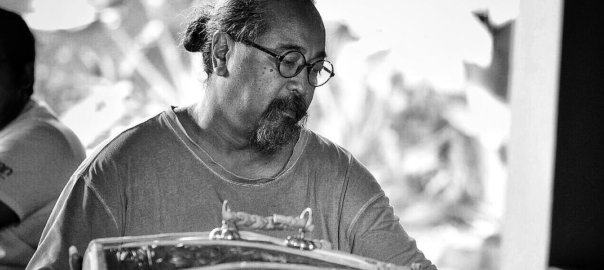The alley was filled with flowers and cardboards with condolences from various communities, all the way from the padepokan (center of arts) till the main road of Bantul, near Jogjakarta. A vast amount of people came to pay respect at the funeral of the beloved percussionist, composer, actor and producer Djaduk Ferianto, who unexpectedly passed away earlier that day, on November 13. All of this I witnessed on Facebook, for there was a continuous stream of photos, videos, condolences, and memories from his family, friends, colleagues and fans.
by Charlie Crooijmans
Born and raised in Jogjakarta (Central Java, Indonesia), Djaduk comes from a progressive, artistic family. His father, the late choreographer Bagong Kussudiardja, started a cultural center (padepokan) where he taught and practiced kreasi baru (new creations), using free movements and sounds based on local traditional musical instruments and dances from all around Indonesia.
Wanting to do fieldwork research in Indonesia, my gamelan teacher at the University of Amsterdam, the late Ernst Heins, recommended me to enter the padepokan, which I did 21 years ago.
It didn’t quite fulfill my expectations, because the school was way after its heyday. But I got the opportunity to meet Bagong’s son: Djaduk Ferianto. Djaduk was involved in many different projects. He became my main informant for my thesis on modern gamelan. With my DAT-recorder in my bag, I followed him everywhere. I even participated at some of the performances of Sinten Remen (kroncong) and Kua Etnika (world music).
Back then, the year 1998, it was a very interesting time! After the fall of president Suharto, the very first elections were held in Indonesia. There was freedom of speech, but lack of education. How do you know who to vote, when there is no proper information?
Together with his brother Butet Kartaredjasa (Teater Gandrik), Djaduk tried to fill that gap with sociopolitical awareness, comedy and music. A journalist of the European Cultural Channel ARTE TV, got in contact with Djaduk, and made a reportage of the festive election time through the musician’s eyes.
To work as a musician or artist wasn’t (probably still isn’t) very easy in Indonesia. I remember that Djaduk, being responsible for so many people, was under constant pressure. It was the era before social media, so it was hard to promote performances, which were usually last minute.
The strength of Djaduk as an artist, in whatever discipline, lies in the fact that he gave it all, and he was focused. This skill was without a doubt cultivated in the early days, when he, as a kid at the music and dance group of his father, learned to play different styles of music by ear. Imitating and improvising, having to add his personal flavor. Because of his great sense of rhythm, movement and sound, it was easy for him to collaborate with different kind of (international) artists. He was also tremendously curious for new sounds and music instruments.
Djaduk combined his art with a vision. He liked to discuss about (pop) music, ethnic appropriation and appreciation. Even though he had a stature of a boss, he called every one “boss” at the rehearsals (there was always a lot of laughter there). It was important for him that his fellow musicians gained self-esteem, by using Javanese symbols, expressions and musical or visual elements. He was proud to be Javanese, and proud to be Indonesian.
As a music journalist based in Amsterdam, I tried to follow his doings at a distance. When he and Kua Etnika had a concert in Frankfurt (Germany, 2015), at a festival about the Indonesian culture, I decided to go there and meet my old friends.
In the interview I had with Djaduk, he explained about the different perceptions of modern traditional music in Indonesia and abroad. For him communication with the audience is the most important thing to achieve. He was also eager to let the world know about the new Indonesian sound, which was a mixture of a multitude of music styles, jazz, impro, virtuoso percussion and an ethnic flavor.
The world of music lost a great musician. Djaduk had still so much to offer. Three days after Djaduk passed away from a heart attack, at the age of 55 – leaving his wife Petra and 5 children behind, Ngayogjazz started. This is a festival Djaduk founded in 2007 to give a boost to the jazz music scene in his hometown. Everyone involved in the festival made a special tribute to him. Moreover, this week the AMI Awards nominated Kua Etnika for the best world music act. They are worth it!
Finally I want to thank Djaduk for sharing his knowledge and musicality. Rest in peace!
Disclaimer: Saya ambil foto dari Instagram Djaduk, tidak ada nama fotografer. Siapa yang tahu, silahkan kirim email.
